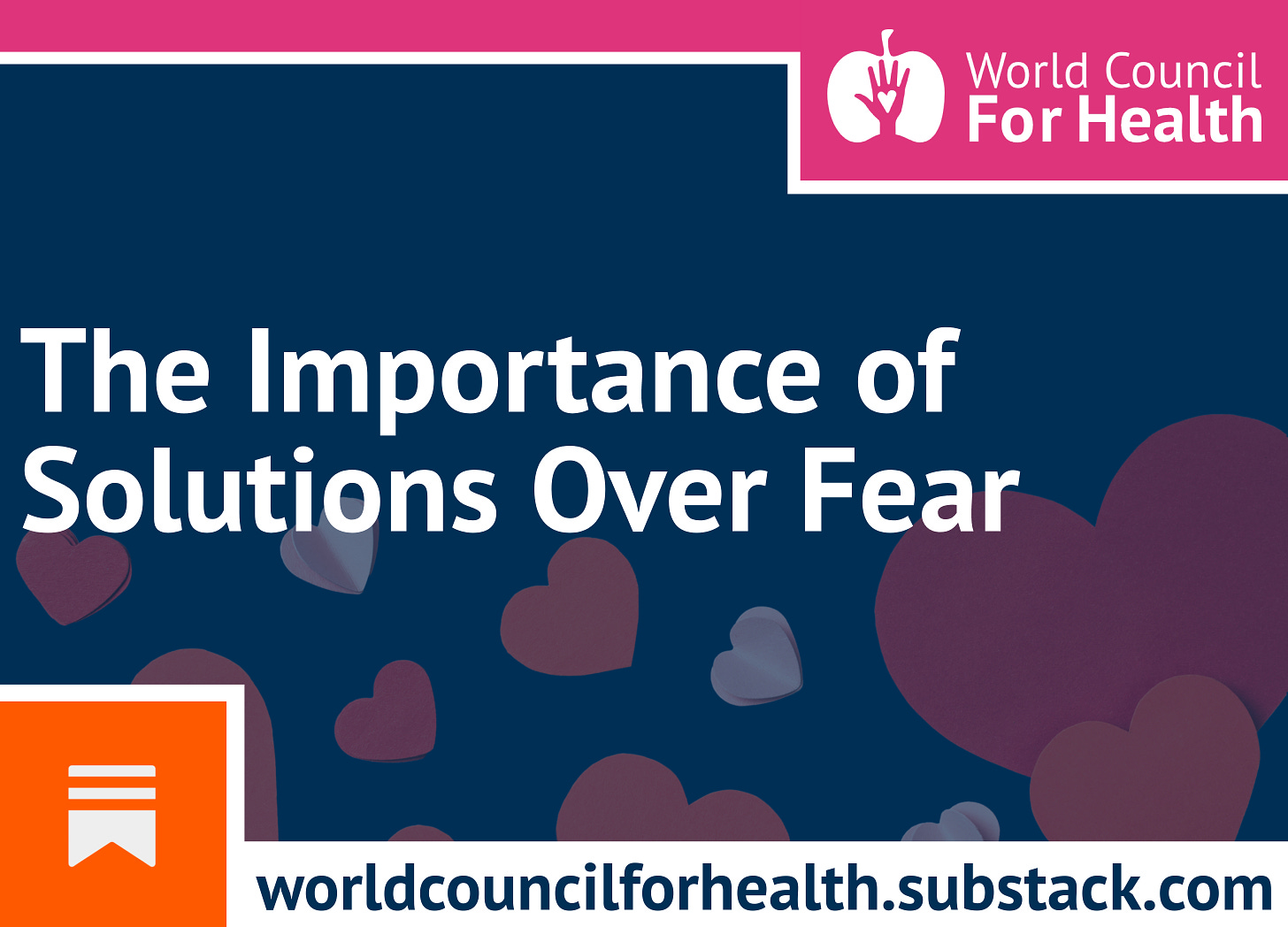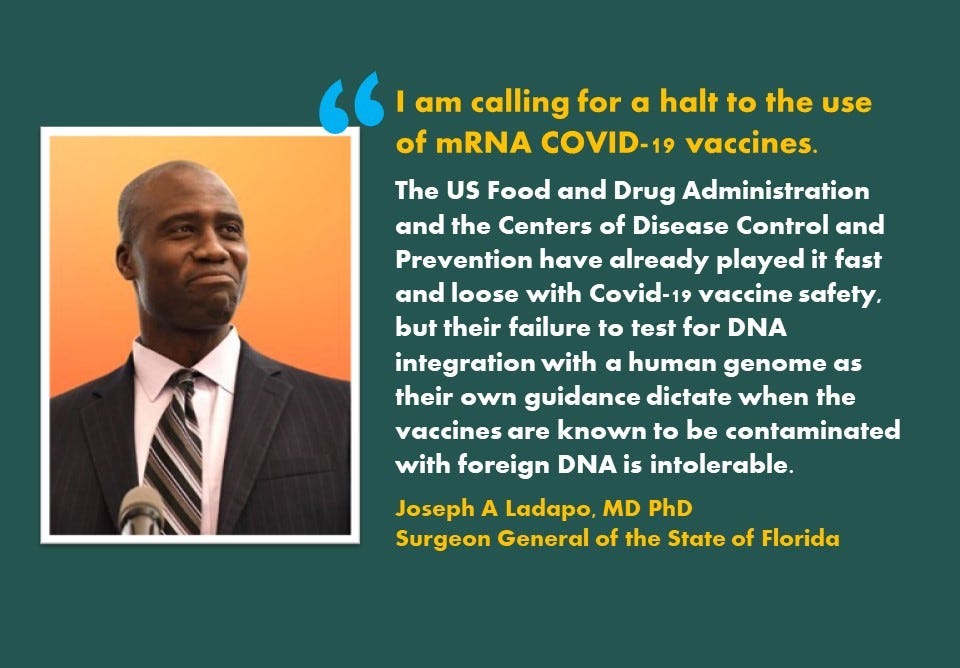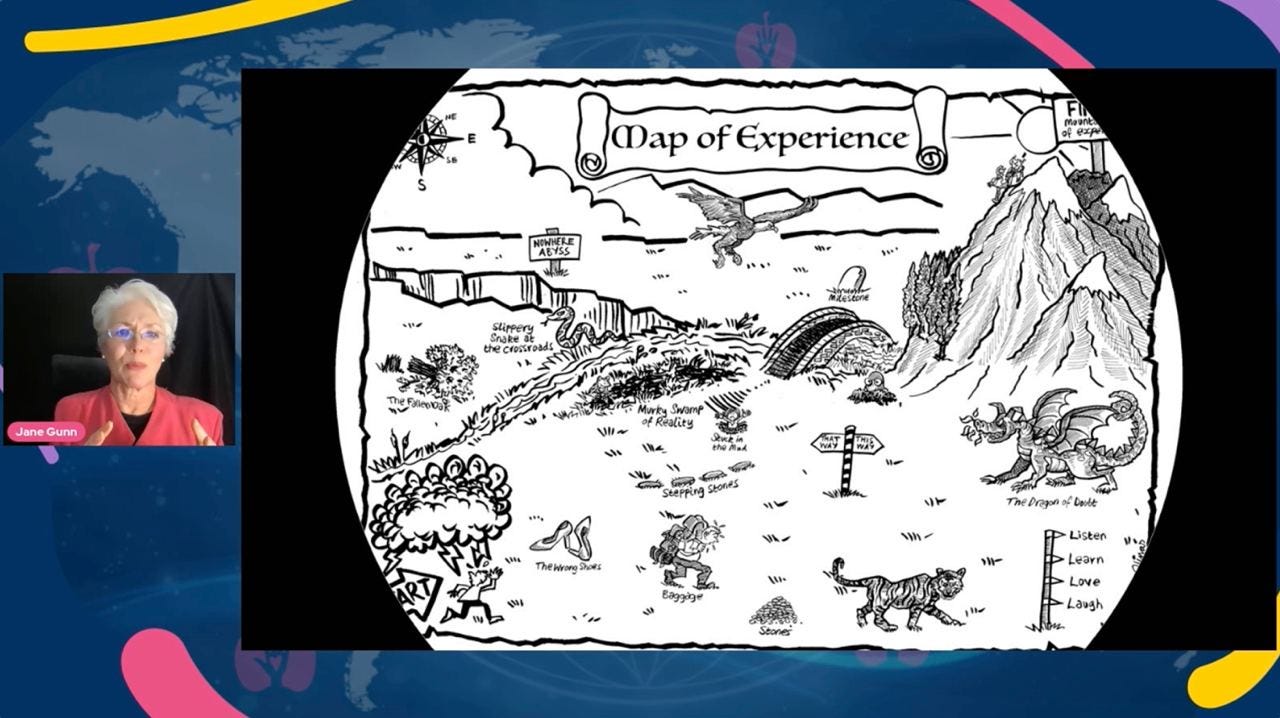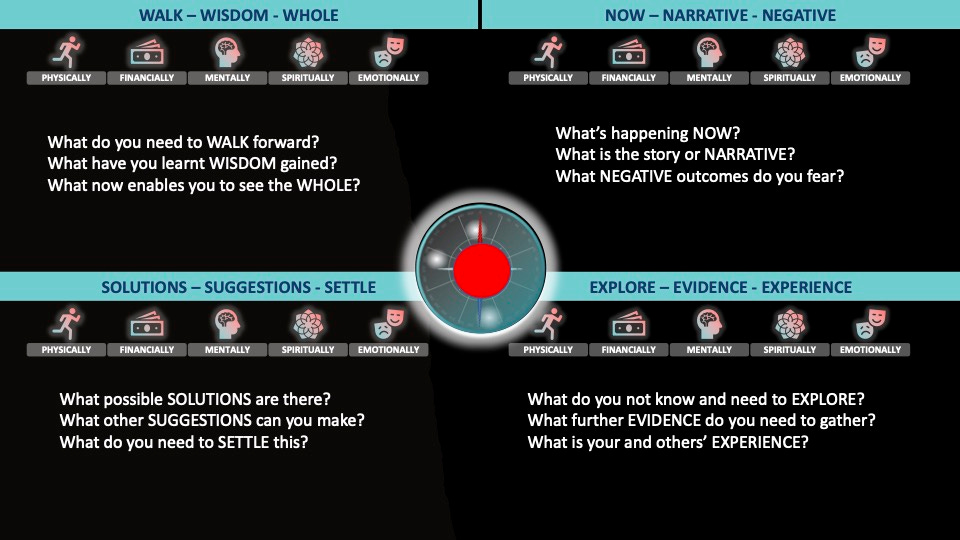The Importance of Solutions Over Fear
“Ancient wisdom says that what has been spoiled through man's fault can be made good again through man's work.” — Dr Tess Lawrie
Written by World Council for Health Correspondent Alice Ashwell, PhD.
Dr Tess Lawrie of the World Council for Health (WCH) welcomed everyone to the first episode of the rebranded Better Way Today online discussions for 2024, noting that in these troubling times, “Ancient wisdom says that what has been spoiled through man's fault can be made good again through man's work.”
How to work together to make things good again was the focus of the session.
Christoph Plothe DO encouraged us with three items of good news:
The worldwide distribution in multiple languages of Professor Sucharit Bhakti’s emergency letter on the dangers of mRNA vaccines,
Dr Ladapo, Florida’s Surgeon General, calling for a halt to the use of Covid-19 mRNA injections, and
Italy’s former Health Minister being under investigation for mass murder over Covid ‘vaccine’ deaths.
Mapping our Journey in Challenging Times – Jane Gunn
Christof introduced Jane Gunn, a conflict resolution expert known as the ‘Barefoot Mediator’. Jane believes that the fields of conflict resolution and mediation offer the skills, tools, and mindset needed to help us prioritise solutions over fear so that we can resolve issues in more positive ways. The author of two popular books, Jane recently released a third, The Mole and the Mountain (available from the WCH shop), described as a book that “takes you on a journey to discover how to negotiate the challenges of life and living in a time of chaos.”
Jane describes conflict as the behaviours through which we express our unhappiness with another person or situation. While a lack of self-esteem has been identified as a root cause of conflict, this is not something we can easily address. But what we can boost is our self-respect. And this comes from behaving in ways that show that we fundamentally respect, like and love ourselves in the way we behave towards others.
Jane explains that we have three choices in how we behave:
We can do what feels good to us,
We can do something that looks good to others, and which satisfies our ego,
But we should really be doing what is good – and this is what develops our self-respect.
Conflict resolution, therefore, depends on our ability to choose to do the right thing. This requires that we maintain our independence, exercise free will, and are able to resist coercion. Situations that rob us of freedom (and therefore self-respect) damage our self-esteem. Then, when we are challenged, we are inclined to experience anger and conflict. The process of mediation, therefore, involves giving choice and the power of self-determination to the parties involved. In order to resolve conflict, they must be able to freely choose the right solution for themselves.
Jane led us through the journey of conflict resolution outlined in the illustrated ‘Map of Experience’ in The Mole and the Mountain.
Conflicts reflect our journeys as individuals, groups, and as a global society, and this map illustrates aspects of these journeys. In fact, it is the lack of a ‘map’ that has made the years since 2020 – and the conflicts that have arisen – particularly challenging.
The compass serves to give direction to the process, guiding dialogue and decision-making. In each case, Jane suggested questions to help people explore the situation.
North: What’s going on Now
On the map, this is illustrated by ‘The Storm’. It is the stage of describing what the individual, group, or society is going through, exploring the various narratives explaining the situation, and understanding the reasons for people’s fears.East: What needs to be Explored more deeply
This is ‘The Murky Swamp of Reality’. It is a place most people want to avoid, but which needs to be explored in depth as it is the source of alternative narratives and solutions. This is the stage of becoming comfortable with not knowing, interrogating evidence to determine its veracity, and exploring the experiences of different role-players in order to get clarity on the issues and to start moving away from fear.South: Possible Solutions
On the map, this is ‘The Crossroads’ – a transition point where one must choose whether to cross ‘The Bridge of Courage’ or fall into ‘The Nowhere Abyss’. The bridge is where we need to think critically and creatively about the best options and solutions for a better way forward.West: How to Walk forward
The final destination on the map is ‘The Mountaintop’ – the place we are all aiming for. It is the place of perspective, of understanding the whole journey, of wisdom, and of exhilaration.
Conflict affects us all physically, mentally, spiritually, emotionally, and often financially. So to thrive in challenging times, we need skills to help us resolve conflicts – or as Jane puts it: “We need to resolve to survive.” And whether conflicts play out in our groups, organisations, or society, it is up to each of us to focus on our individual journeys, to be faithful to the inner journey of awareness and consciousness, and to trust others to find their own way.
Jane’s final point was about the need for, and the power of, conversations. She left us with a diagram summarising the most important questions from the compass model mentioned above. In the year ahead, let us all seek to come together and stimulate discussions that can help us move beyond conflict, and develop a positive vision of the future.
There are hundreds of paths up the mountain, all leading to the same place. It really doesn't matter which path you take. The only one wasting time is the one who runs around the mountain telling everyone that his or her path is wrong. – Hindu proverb
Emotional & Relational Connection: The Elephant in the Room & Our Stairway to Heaven – Nick Haynes
“It's time for us human beings to dare to dream and practically
create the world that our hearts and souls so desire.”
Nick Haynes is a couples and relationship counsellor in private practice, who uses an approach called Emotionally Focused Therapy (EFT). EFT draws upon attachment theory and recognises that when couples experience distress this gradually diminishes their sense of feeling loved, valued, or a ‘good fit.’
Nick believes that the human race is missing a huge ‘elephant in the room’, which could transform our species and create a more heart-based, loving society. This ‘elephant’ is our biological need for emotional and relational connection, which primes much of our behaviour, both positive and negative. Nick proposes that a benign, loving, and thriving future depends on us learning how to communicate verbally and share our vulnerable emotions and relational needs with one another.
Emotional and relational connection
Humans are born with the need to form a close emotional bond with a caregiver, and this need for close emotional connections continues from cradle to grave. Biologically, humans are social mammals who benefit from a sense of belonging. At the same time, we are also individuals who enjoy independence and autonomy. We thrive in a state of interdependence, enjoying our individuality and having access to other human beings we feel close to. We could describe this need for bonding and connection as a kind of invisible grid or web that connects all of us.
Our need for human connection primes a significant amount of our behaviour, reactions, and responses to one another. Indeed, connection is for the mind what oxygen is for the body. It creates security and stability for our inner world and gives us a window into understanding human society and interactions.
Being emotionally vulnerable, however, is scary. If we reveal our feelings, we run the risk of being misunderstood, even rejected, which will lead to us feeling even more isolated, disconnected, and lonely. Many of us try to minimise this risk through coping strategies, including hinting, explaining, intellectualising, getting angry, stonewalling, shutting down, attacking or defending. But if you aren’t able to say what you need or want, how will you get what you desire?
Surprisingly, we may experience a certain alchemy when we feel emotionally vulnerable and are able to share this with someone else. Indeed, emotional vulnerability invites receptivity and loving responses from others. The experience is visceral. You can sense it.
What might vulnerability sound like?
Nick shared a narrative to illustrate the qualities and opportunities of deep vulnerability:
I've never tried saying it like this to you before. I don't feel that I'm going to say it right, and I'm very scared that you'll think I'm weak, needy and dismiss me. Normally, I get angry and tell you what you're doing wrong, and you feel criticised; while really, underneath, I'm feeling sad, isolated and alone. I don't want to keep on doing that. Really, I'm just wanting to know that I matter and that you love me. Please, can you hug me and tell me that you do?
In reflecting on the narrative, he pointed out that many of the sentences start with the word ‘I’. This is a departure from what generally happens when we feel unheard or misunderstood by others; then we often start our sentences with “You …”. What the other person’s brain registers is that they are getting something wrong, or that they will not be listened to. After that, they don't even bother to listen to the rest of what we have to say. So the first observation is that it is helpful, constructive, and productive to use a lot of ‘I’ words.
Secondly, when we explain that we feel uncertain, scared, or vulnerable, rather than expressing anger, the listener may be surprised, curious, and more inclined to listen. They will also be less defensive, as they are not being told that they are in the wrong.
Thirdly, by acknowledging to the listener that our anger may make them feel criticised, they realise that we understand how they are feeling. By now, the listener may be feeling more receptive, empathic, and compassionate and able to acknowledge our vulnerability.
Finally, the listener may be able to accept our concrete suggestions or requests for what we need, and be better able to appropriately comfort, reassure, or soothe us.
From hunting and gathering to artificial intelligence
Humanity has evolved through three main stages – hunter-gatherer, agriculture, and industrialisation – and is now in the fourth, technological, stage. In cosmic terms, however, we may only be somewhere between the stages of childhood and adolescence.
We were made for love and freedom, but throughout our civilisations we have had difficulty expressing this. Instead we have learnt to screen out vulnerable emotions. The education system has trained us to communicate rationally and intellectually, but we are less ‘fluent’ emotionally and psychologically, and prone to misunderstandings.
How do we become the heart-based, loving species that we truly are?
We need to keep reminding ourselves that our nature is love, and to use the word ‘love’ more widely. Humanity needs to develop greater understanding of our need for connection with one another, and how to share our vulnerable emotional needs when this is helpful. Living into this reality will gradually sow the seeds of a more loving, caring and less violent world.
The mainstream curriculum needs to become much broader and more holistic, sharing knowledge that benefits humanity. Nick described this approach to education as “the actions of a wise, loving, caring tribe that wants to give its members a full toolkit for life.” This includes age-appropriate programmes for children in which they learn about relationships, emotions, and the need for connection, and develop skills of mediation, validation, and non-violent communication (NVC).
In planning a ‘better way forward’ Nick believes that psychology should play a key role, as it helps us to understand our need for relational connection and how to engage from a place of vulnerability. He believes that, over time, this will transform human beings into a loving, conscious and highly evolved species.
The Greater Reset – Derrick Broze
Derrick founded the Conscious Resistance Network in 2013 and has been writing for a variety of independent media outlets ever since. His latest book, How to Opt Out of the Technocratic State, offers practical solutions to current challenges. His recent documentaries include Bringing Down Jeffrey Epstein, The 5G Trojan Horse, and a 17-part series The Pyramid of Power.
Derrick is co-founder of the Freedom Cell Network, an international decentralised movement encouraging people to build local mutual aid groups and parallel systems. In 2021, they launched the Greater Reset, a solutions-focused event offering an alternative to the World Economic Forum's vision of a Great Reset. The Greater Reset, the Freedom Cell Network, and the Conscious Resistance Network are all coalition partners of the World Council for Health.
Derrick was unable to attend the live discussion as he was travelling to Mexico for this year’s Greater Reset 5 Manifestation, running from 17-21 January 2024. Emma Sron shared a short promotional video of the Greater Reset 5, after which we watched a recorded message from Derrick en route to Morelia, Mexico.
Derrick extended an invitation to attend the event in person (tickets are US$200 or free for Mexican citizens) or follow the event online free of charge by signing up at thegreaterreset.org. Presentations will be in English and Spanish. It will be a wonderful opportunity to hear from over 40 inspiring speakers and connect with a diverse group of like-minded people who care about freedom and who want to do something for the future and leave behind a better world for those coming after us.
If you find value in this Substack and have the means, please consider making a contribution to support the World Council for Health. Thank you.








Please consider interviewing Paul Levy and his work and understanding of wetiko - an indigenous word meaning evil which has become a collective conscious of biblical plague - perhaps we are living through and close to the turning point now from a dark age?
https://www.awakeninthedream.com/